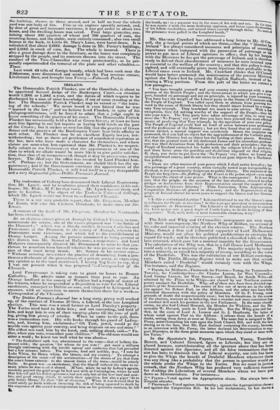Mr. Sharman Crawford has addressed a long letter to Mr.
O'con. nell, the pr incipal points of which are these,—that the " Member f Ireland" has always considered measures and principles of seconds; importance when compared with the possession of patronage or the power to put men of Liberal opinions in office; that by his biegaii with the Ministers he has got the patronage of Ireland, and is therefore ready to defend their abandonment of measures be once insisted teem as essential to the welfare of the country; and that this policy is short. sighted, and will eventually prove more injurious than profitable to the Liberal cause even in Ireland. Mr. Crawford thinks that O'Connell would have better promoted the maintenance of the present Ministers against the Tories had be joined the English Radicals, instead of be. coming a Whig partisan. From this putt of the letter we extract a few passages- " You have brought yourself and your country into contempt with a pea portion of the British People ,• and the Government to which you give a sup, port, founded on patronage and not on principle, is injured by your counezion. You have hurt the weight of the Liberal party in the House of Commons with the People of England. You called upon them to abstain from pressing for. ward in the cause of British liberty lest they should injure Ireland by a tempo. racy Tory triumph. They hearkened too much to your advice. With a fa, exceptions, they did nothing worthy of the support of the People—they feg into your train. The Tory party have taken advantage of this, to raise ooce mole the • No Popery' cry ; acid thus you have been yourself the most effectual means of prodneing that Tory triumph, by the operation of your own policy. The People of England could find no bond of union between your professions and the professions of the Ministry ; but yet they found that an actual cornier. nation existed, a mutual support was mauifested. Hence the suspicion vas generated, th it you had no object but the aggrandisement of the Catholic party, and that the Ministry had no object but the holding of their places. Recollem, Sir, that the greatest fault of the dethroned James awl his immediate predeces, ears was their deviations from their professions and their principles ; that the People of England connected his faults with the religion which he professed; and from hence arose the penalties and disabilities imposed on that religion, If, then, you desire to put down the 'Nu Popery' cry, follow an honest and straightforward course, and do not strive to attain youi objects by a Machine'. lian policy.
"There are other sources of your power which I shall notice hereafter ; but this patronage of a great country, when virtually vested in an irresponsible is. dividual, is one preeminently dangerous to public liberty. The interests of the People arc forgotten—the flotterw of the Court is the prime oljeet—you make the Queen the ubject of your praise. What is the consequence? Is it not the
case that the people, on the occasion of the late elections, claimed no other pledges or declarations from their Representatives except the support of the Queen and the Queen's Ministry ? Tithe Extinction, Tithe Appropriation, Corporation Reforin—all placed in abeyance; and the Reprentatives of the people of Irelaud elected for seven years to support the Queen and her Govern. mem.
" Is this emstitutional doctrine ? Is it constitutional to use the Queen's name to influence the People at elections? Is this a proptr precedent to emanate from the supporter of Democracy ? The Liberator of Ireland agitating to convert the lush nation into a gie depiit of Castle hacks, to do the bidding of their wept,' ties ! Well, well, well—a most lamuurable situatiou, trimly!"


























 Previous page
Previous page